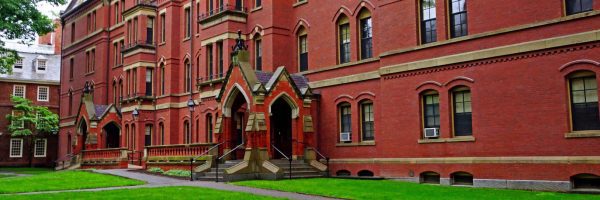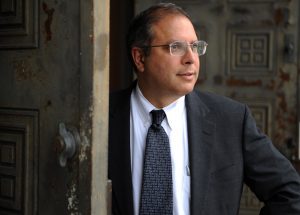Revolutions in Big Data, Housing, and More – Boston News

Let’s explore some of the most interesting stories that have emerged from Boston business schools this week.
So Much For The Robocalypse – Everett
BU Questrom School of Business Richard C. Shipley Professor in Management Iain M. Cockburn, an expert in innovation, was recently interviewed by the business school’s magazine, Everett, about his new paper “The Impact of Artificial Intelligence on Innovation.” His research, written alongside members of Harvard and MIT and published in the National Bureau of Economic Research, explores the long-standing potential of artificial intelligence, which can become a more all-purpose technology, rather than a niche concept or simply a tool to replace every degree of human labor.
Cockburn argues that AI, if used wisely, can replace the menial tasks associated with white collar employment, such as legal services.
“What a lot of people are sitting up and noticing is that this form of automation or replacement of human work with a computer is now percolating into areas that have been largely unaffected by previous technological revolutions,” he says. “Take legal services. It turns out that by using this technology, you can create systems that will do a lot of low-level legal work, like scanning contracts, reviewing contracts, or reviewing documents.”
A pessimistic view could say developments like this could lead to job loss, which may be true. However, in the evolution of the modern job environment, flushing out repetitive tasks that do not require critical or imaginative thinking could allow people to focus on larger issues, rather than bogging down daily routines.
“Then there’s a second question: ‘If I didn’t have to spend so much of my day doing that, what could I be doing that involves imagination, insight, critical thinking?’ So, for some people, their jobs are going to get much more interesting.”
You can read more from the Everett interview of Cockburn here, and check out the “The Impact of Artificial Intelligence on Innovation.”
Could Big Data Replace the Creative Director at the Gap? – Harvard Business Review
Assistant Professor Ayelet Israeli, “an expert in channel management, pricing, online marketing, and eCommerce” took to HBS’s Cold Call Podcast to discuss Gap CEO Art Peck’s move to eliminate its creative director and “turn to big data to predict what the big next designs are going to be.”
Since Gap is now identified as a basics brand, Israeli explains that “maybe it’s okay to sell the trend that everyone else is selling. If you’re selling something that is more fashion forward, then you’re in a bigger problem because you need someone to create this new trend and not just spot the trend that everyone else is doing.”
“The other part of [Peck’s big data] strategy is essentially to shorten production cycles that they had at the Gap. They were from traditional companies that take about 10 months, almost a year, from when they decide on something and it reaches stores. Now they shortened it to about eight to 10 weeks for most of their product categories.”
You can find the full HBS article here.
Corcoran Center to Debut Housing Case Competition – Boston College News
BC Carroll’s Corcoran Center for Real Estate and Urban Action announced a new case competition and panel discussion moderated by Boston Capital Vice President and Director of Communications David Gasson entitled, “The Future of Housing.”
The competition is “intended to hone students’ analytical skills in the field, raise awareness about issues connected to affordable housing development, and offer an in-depth look at the Low-Income Housing Tax Credit as a tool that helps both communities and developers of affordable housing.”
Corcoran Center Executive Director Neil McCullagh writes, “This competition will be a way for students to understand that housing challenges are deeply connected to every facet of our lives. It will also provide them great vision into an industry where they can do well while doing good.”
“In the competition, students will be analyzing a real housing deal. They will need to present their best understanding of the policy and their analysis of the deal outlined in the case. They will then present their solution and recommendations to the judges. The best team will walk away with the grand prize.”
Read more about the “Future of Housing” case competition here and the full Boston College News article here.
New Dean Will Lead Cornell SC Johnson College of Business

Economist and labor market scholar Kevin F. Hallock has been appointed dean of the Cornell SC Johnson College of Business beginning December 15, Provost Michael Kotlikoff announced yesterday afternoon. The Cornell College of Business, formed in early 2016, integrates the Samuel Curtis Johnson Graduate School of Management, the School of Hotel Administration, and the Charles H. Dyson School of Applied Economics and Management.
An experienced administrator, Hallock has served as dean and professor in the School of Industrial and Labor Relations (ILR) since 2015. His new term as dean of the College of Business was approved by the Cornell Board of Trustees executive committee and will run through June 30, 2024. Kotlikoff said in a statement that a search for a permanent ILR School dean to replace Hallock will begin immediately and an interim dean will be named next week.
“As an accomplished economist, scholar, and administrator, Kevin provides the Cornell SC Johnson College of Business with the leadership to maximize its enormous potential,” Kotlikoff said in a statement. “His thorough familiarity with Cornell’s administrative workings is a significant asset, and the college will be well served by his deep understanding of business administration theory and practice.”
Overseeing the combined schools of the Johnson College of Business is a big job. The decision to unify the three schools under a single umbrella was reached because it promised to make a wider range of opportunities available to students while also increasing Cornell’s ability to draw top recruiters and faculty. But Founding Dean Soumitra Dutta stepped down unexpectedly in February, and L. Joseph Thomas has been serving as interim dean since he left.
Hallock Brings Record of Strong Leadership
As ILR dean, Hallock’s accomplishments were many, including guiding the school through a strategic planning process, investing in student experience and well-being, and introducing a school-wide initiative to unite students, staff, and faculty around a common theme, such as “Technology and the Evolution of Work,” which has been this year’s theme. He also brings fundraising prowess, having raised resources for new investments in IRL faculty and research, expanded human resources, and a transition of ILR’s New York City office to a new home at 570 Lexington Ave, slated to open in January 2019.

Kevin Hallock, the next dean of the Cornell SC Johnson College of Business. Photo credit: Jesse Winter Photography
“Grateful and Excited to Start This New Chapter at Cornell”
Hallock said he is “grateful and excited to start this new chapter at Cornell” but realizes he has his work cut out for him.
“The Cornell SC Johnson College of Business, in its infancy, faces challenges, like many new organizations, and those challenges are part of what attracted me to this role,” he said in a statement. “But there is also enormous opportunity, outstanding strength, and unique advantages in the college and its three schools. I am excited to work with its talented staff, students, faculty, and alumni, and I am exceptionally optimistic about the future of the college.”
The College of Business notes that it has already celebrated several milestones in its first couple of years. Applications for open faculty positions in 2017-18 increased five-fold over prior years in some areas, the school reports. Not only that, more faculty who have been offered positions have accepted them than ever before, resulting in the successful hires of 20 new faculty. Undergraduate application volume at both the Charles H. Dyson School of Applied Economics and Management and the School of Hotel Administration grew by 80 percent between 2016 and 2018. Application volume at the Johnson Graduate School of Management is down just slightly year over year, less than one percentage point. This puts Johnson ahead of many of its U.S. peer business schools, which experienced even greater declines.
An expert on executive compensation, compensation design, and labor markets, Hallock’s research has focused on the complexity of executive compensation contracts and corporate performance and been featured in academic journals including The American Economic Review, the Journal of Corporate Finance and the Journal of Financial and Quantitative Analysis. The Sloan Foundation and the U.S. Departments of Labor and Education are among many organizations that have helped to fund his research.
Long History of Involvement at Cornell
A longstanding member of the larger Cornell family, Hallock joined the faculty of ILR in 2005 and became its dean in 2015. During his tenure, he also has played an active role on several university committees, including Cornell’s Financial Policy Committee, the Provost’s Budget Model Task Force, and the Cornell Student Experience Initiative’s steering committee. In 2009, he was the founding director of Cornell’s Institute for Compensation Studies.
Outside of Cornell, he has also been active as a research associate at the National Bureau of Economic Research since 2003. And in 2013, he was elected a fellow of the National Academy of Human Resources. He has consulted and served as an expert witness on issues of compensation, executive compensation, stock price reactions to labor market events, and antitrust in labor markets.
Hallock holds a bachelor’s degree in economics summa cum laude from the University of Massachusetts, Amherst, and master’s and doctoral degrees in economics from Princeton University.
Learn more about the newly appointed dean of the Cornell SC Johnson College of Business.
This article has been edited and republished with permissions from Clear Admit.
Wharton Economist, Berkeley Alum Ann Harrison Named New Haas Dean

Ann Harrison, a renowned economist and member of the faculty at the University of Pennsylvania’s Wharton School, has been named the next dean of the UC Berkeley Haas School of Business. Harrison earned her undergraduate degree from Berkeley and served as a professor in Berkeley’s Department of Agricultural and Resource Economics from 2001 to 2011.
“Professor Harrison is an accomplished administrator as well as a world-class economist who has dedicated her career to creating forward-looking policies in development economics, international trade, and global labor markets,” Berkeley Chancellor Carol Christ said in a statement announcing the appointment. “It is a great honor to welcome her back to Berkeley to become the dean of Haas, and I have no doubt that she will be a wonderful leader the institution.”
Harrison, who will begin her term on January 1, 2019, said she is thrilled to return to Berkeley and looks forward to meeting Haas students and alumni and working with its distinguished faculty and staff, according to the release from the school.
Harrison worked as director of development policy at the World Bank before joining the Wharton faculty in 2012, co-managing a team of 300 researchers and staff. In her time with the World Bank, she reformed its research fund allocation process and supervised its most important publications, including the annual World Development Report. Setting a milestone in transparency for the institution, she convinced the World Bank’s president to release all historical records on project loans.

Ann Harrison named new Haas dean
“Ann has a remarkable track record of pioneering research on trade and development, including influential studies of globalization’s effects on jobs and inequality,” Berkeley Economics Professor Maurice Obstfeld said in a statement. Obstfeld serves as chief economist at the International Monetary Fund and was a colleague of Harrison’s when she worked in Berkeley’s Agricultural and Resource Economics Department.
Princeton Professor Emeritus Sir Angus Deaton, who has known Harrison since her days as a graduate student at Princeton, praised her appointment. “Based on Ann’s experience at the World Bank, she will be an effective and much-loved manager,” said Deaton, who also holds the 2015 Nobel Laureate in Economic Sciences for his analysis of consumption, poverty, and welfare.
In addition to a Ph.D. in economics from Princeton, Harrison also holds a diplôme d’études universitaires générales from the University of Paris and is a research associate at the National Bureau of Economic Research and a member of the United Nations Committee for Development Policy. Author and editor of three books—including Globalization and Poverty and The Factory-Free Economy—Harrison is one of the most highly cited scholars globally on foreign investment and multinational firms.
Harrison replaces outgoing Dean Rich Lyons, who stepped down in June 2018 after serving as Haas dean for the past 11 years. He plans to return to teaching at Haas after completing a sabbatical. Haas Professor Laura Tyson, who has served as interim dean since Lyons’ departure, will remain in the role until January, 2019.
This article has been edited and published with permissions from our sister site, Clear Admit.
LAPD Celebrates Latest Executive Programs Grads – Los Angeles News

We’ve rounded up the latest news coming out of business schools in the Los Angeles metro this week.
LAPD Chief Salutes Latest Officers to Finish Innovative Executive Program – Claremont Graduate University Newsroom
New LAPD Police Chief Michel Moore celebrated this year’s graduates of the Police Chiefs Executive Leadership Institute at Claremont Graduate University’s Peter F. Drucker and Masatoshi Ito Graduate School of Management recently. Now in its second year, the partnership between the Drucker School of Management and the California Police Chiefs Association invites police officers to the CGU campus for two intensive weeks in the study of management. Through training with Drucker faculty, the officers learn about management techniques, who they are as leaders, and where to make improvements in the way they lead. Thirty-four officers graduated from the program this year.
“The LAPD has been a partner with this school for a long time,” comments Police Chief Moore at CGU during graduation. “This is a progressive school defined by an ethos and values of how to give back to our communities, how to live our best lives, which is what I think we all want for ourselves.”
You can read more about CGU and the California Police Chiefs Executive Leadership Institute here.
UCI Paul Merage School of Business Center for Real Estate Receives Gift to Support Creation of Bill Halford Family and Bixby Land Company Student Award Endowed Fund – UCI Paul Merage Newsroom
A new gift from the Bixby Land Company will create a new endowed fund at the Paul Merage School of Business at the University of California, Irvine’s Center for Real Estate. The gift will benefit merit-based graduate and undergraduate students interested in studying real estate and becoming an active member of the center.
The award is given in recognition of Bill Halford, the chief executive of commercial real estate developer Bixby Land Co, based in Newport Beach, who passed away earlier this year. Serving as chairman for Merage’s Center for Real Estate Advisory Board since 2006, Halford was a staunch supporter of higher education who encouraged the university to place focus on their graduate-level real estate program. He also served as a guest lecturer and often helped moderate education symposiums at the center.

(Left to right) Nakamura Brown, Merage School Dean Eric Spangenberg, Bixby Land Company President Aaron Hill, Cindy Halford, Center for Real Estate Faculty Director Ed Coulson, Center for Real Estate Advisory Board Co-Chair Watty WatsonNakamura Brown, Merage School Dean Eric Spangenberg, Bixby Land Company President Aaron Hill, Cindy Halford, and Watty Watson / Photo via merage.uci.edu
Read more about the Bill Halford Family and Bixby Land Company Student Award and Merage’s Center for Real Estate here.
Employees Actually Work Harder If They Think Their Boss Gets a Big Fat Paycheck – MarketWatch
New research from Ricardo Perez-Truglia, Assistant Professor at UCLA’s Anderson School of Management, looks at the impact that knowing your coworker’s or boss’ salary may have on work ethic.
Circulated by the National Bureau of Economic Research, Perez-Truglia worked alongside Harvard Business School Assistant Professor Zoë Cullen to complete the study, which surveyed 2,060 employees at a large commercial break. According to the research, companies that try to prevent you from finding out the salaries of your coworkers may have good reason; employees who believed their coworkers’ made a higher salary than they did typically worked fewer hours and were more likely to leave the company. Conversely, employees who perceived their manager to have a higher salary than they do were likely to work more hours.
The perception of this makes sense from the rationale of the employer. Not only does the research support this methodology, but keeping salary details under wraps is a common union-busting tactic at larger companies. Union activity tends to correlate with larger salaries for lower and mid-level employees. It is illegal in the United States to prevent employees from discussing wages with one-another. However, several large companies, such as T-Mobile, tend to skirt the rules anyway.
You can read more about Perez-Truglia’s research here.
Where Have All the New Ideas Gone? – Boston News

Let’s explore some of the most interesting stories that have emerged from Boston business schools this week.
New Ideas are Getting Harder to Find—and More Expensive – MIT Sloan Newsroom
MIT Sloan recently examined just how difficult is it to come up with new ideas in an age of seemingly infinite access.
A new National Bureau of Economic Research study published by MIT Sloan Professor of Applied Economics John Van Reenen, Stanford University professors Nicholas Bloom and Charles I. Jones, and Stanford Doctoral candidate Michael Webb finds that “the productivity of scientific research is falling sharply across the board” due in large part because “researchers are putting in more and more effort to sustain the same—or even a slightly lower—pace of idea generation as we experienced half a century ago.”
Van Reenen writes, “As the total amount of knowledge becomes larger and larger and larger, it becomes increasingly difficult to get to its frontier of that knowledge. It was much easier a couple thousand years ago.”
Two workarounds are to narrow the “focus of one’s studies to specialize in a very particular domain” and expand investment into research. However, both solutions arrive with their own sets of challenges, according to Van Reenan.
“In order to carry on innovating, you’re constantly working together, and it’s very complicated to get all of these people and ideas together.”
Van Reenan is concerned that government investment into scientific research is simply not enough of a high priority.
“I think a lot of the time you hear we’ll just cut the top tax rates to generate lots of innovation — I’m pretty skeptical about that in terms of the incentives you’re going to give. Both have positive effects on growth and equality. Instead of giving away $5 trillion in tax cuts, use that to invest in growth opportunities for the future.”
You can read the full article from MIT Sloan here.
No More General Tso’s? A Threat to ‘Knowledge Recombination’ – Harvard Business Week
HBS Technology and Operations Management Unit Assistant Professor Prithwiraj “Raj” Choudhury is set to publish a new Strategic Management Journal paper that explores the “role ethnic migrants play within the work force,” as well as the “new technologies in countries where they’ve migrated.”
Choudhury points to examples throughout history like Soviet mathematicians who “came to the United States in the 1990s after the fall of the Soviet Union; far ahead in fields like partial differential equations and symplectic topology, they helped their American counterparts solve otherwise intractable problems,” American Chinese cuisine staples like General Tso’s chicken and chop suey, and Indian immigrants who brought double-entry bookkeeping to South Africa in the late 19th century.
Choudhury uses ‘The Ethnic Migrant Inventor Effect: Codification and Recombination of Knowledge Across Borders,’ written with HBS doctoral student Do Yoon Kim, as a launch pad to discuss immigration through the lens of knowledge production rather than job creation—or absorption.
“Instead of seeing migrants through the lens of whether they create jobs or not, we should view migrants as carriers of knowledge—knowledge that could be further recombined by locals. If H1-B was scrapped, or Europe stopped admitting skilled migrants, the knowledge production of the global economy would suffer.”
Choudhury adds, “It’s not only a loss to the firms, it’s also a loss to local workers, who will lose out if they do not imbibe this knowledge from migrants. I would turn the debate on its head and say, it’s not about destroying or creating jobs, it’s about participating in or losing out on creating knowledge.”
You can read the full article here.
Coffee Break – Sawyer Business School
MassChallenge, the self-described “most friendly start-up accelerator on the planet” recently selected WarmUp Protein Coffee, a “coffee-cum-protein beverage” developed by Sawyer Business School alum James Testa (BSBA ’17) as part of Sawyer’s “Crowdfunding the Venture” class.
Testa writes about how getting rejected from last year’s competition sent him back to the drawing board and enabled WarmUp to stand out among the other 1,600 applications. In a recent interview with his alma mater, Testa says:
“I spent all year getting the product out there, building the business, and getting some sales. So when I went back to MassChallenge this year, I feel like I had a much better grasp of my business and who my customers were. And because I had real sales, I was a lot more confident about it. The proof of concept was already there.”
MassChallenge start-ups “get free office space, connections to industry-specific mentors, advice from venture capitalists, and the chance to win up to $1.5 million to help launch a business.”
You can read the full article here.
Chicago Booth Professor Anil Kashyap Honored By Japanese Government

Last month, University of Chicago Booth School of Business professor Anil Kashyap received the Order of the Rising Sun, Gold Rays with Neck Ribbon award by the Japanese government. This prestigious award honors the renowned economist’s distinguished achievements and contributions to Japan.
Kashyap was honored for the significant role he played in promoting and disseminating high quality research on the Japanese financial system and economic policies. According to the school, he coordinated conferences bringing together Japanese and American researchers in partnership with the Economic and Social Research Institute, the think-tank under the Cabinet Office of Japan.
“It has been an honor and a privilege to work with the Cabinet office on these conferences. They have generated many good research papers, forged some collaborations and hopefully have helped with the policy process,” Kashyap said after receiving the award.
The Order of the Rising Sun was originally established in 1875 by Japanese Emperor Meiji as the first national decoration awarded by the Japanese government. However, a modern version has been awarded to non-Japanese recipients since 1981.
Today the award honors individuals who have made significant contributions to international relations, promotion of Japanese culture, advancements in their field, development in welfare, as well as preservation of the environment. Kashyap was among 149 foreign recipients of the award this year.

Anil Kashyap/Photo via Chicago Booth
Prior to joining the Chicago Booth faculty in 1991, Kashyap spent three years as an economist for the Board of Governors for the Federal Reserve System. In addition to his exploits in Japan, he is on the Board of Directors of the Bank of Italy’s Einuadi Institute of Economics and Finance, is a member of the Squam Lake Group, and serves on the International Monetary Fund’s Advisory Group on the development of a macro-prudential policy framework. Since 2016 he has been an external member of the Bank of England’s Financial Policy Committee.
Kashyap is currently the Edward Eagle Brown Professor of Economics and Finance at Chicago Booth. His research has won him numerous other awards, including a Sloan Research Fellowship, the Nikkei Prize for Excellent Books in Economic Sciences, and a Senior Houblon-Norman Fellowship from the Bank of England.
Kashyap also currently works as a consultant for the Federal Reserve Bank of Chicago, and serves as a member of the Economic Advisory Panel of the Federal Reserve Bank of New York, and as a Research Associate for the National Bureau of Economic Research.
